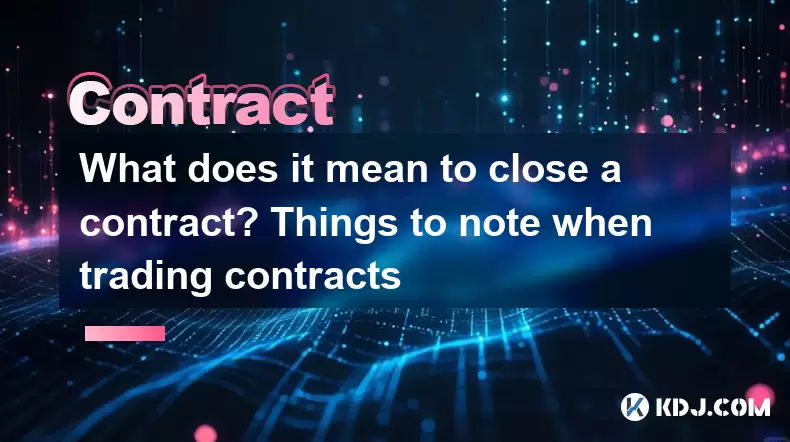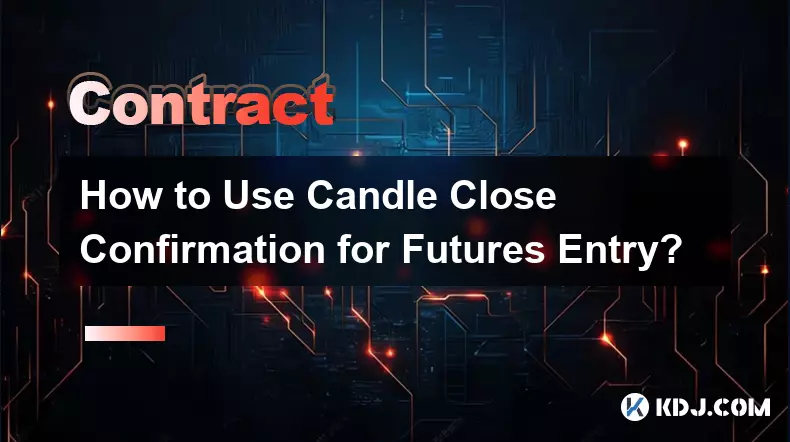-
 bitcoin
bitcoin $87959.907984 USD
1.34% -
 ethereum
ethereum $2920.497338 USD
3.04% -
 tether
tether $0.999775 USD
0.00% -
 xrp
xrp $2.237324 USD
8.12% -
 bnb
bnb $860.243768 USD
0.90% -
 solana
solana $138.089498 USD
5.43% -
 usd-coin
usd-coin $0.999807 USD
0.01% -
 tron
tron $0.272801 USD
-1.53% -
 dogecoin
dogecoin $0.150904 USD
2.96% -
 cardano
cardano $0.421635 USD
1.97% -
 hyperliquid
hyperliquid $32.152445 USD
2.23% -
 bitcoin-cash
bitcoin-cash $533.301069 USD
-1.94% -
 chainlink
chainlink $12.953417 USD
2.68% -
 unus-sed-leo
unus-sed-leo $9.535951 USD
0.73% -
 zcash
zcash $521.483386 USD
-2.87%
What does it mean to close a contract? Things to note when trading contracts
Closing a contract in crypto trading finalizes your position, realizing profits or losses. Understanding closure mechanics is crucial for effective market navigation.
May 30, 2025 at 10:15 am

In the realm of cryptocurrency trading, the term 'closing a contract' refers to the action of ending an open trading position. This could be a futures contract, options contract, or any other type of derivative contract that you have entered into. When you close a contract, you finalize your position, and any profits or losses are realized. Understanding the mechanics and implications of closing a contract is crucial for any trader looking to navigate the volatile waters of crypto markets effectively.
Types of Contracts in Cryptocurrency Trading
Cryptocurrency trading involves various types of contracts, each with its own set of rules and mechanisms for closure. The most common types include futures contracts, options contracts, and perpetual swaps.
Futures Contracts: These are agreements to buy or sell a cryptocurrency at a future date at a predetermined price. Closing a futures contract involves either selling the contract before its expiration date or holding it until expiration and settling the difference between the contract price and the market price.
Options Contracts: These give the buyer the right, but not the obligation, to buy or sell an asset at a set price before a certain date. Closing an options contract can be done by exercising the option, letting it expire worthless, or selling the option to another party.
Perpetual Swaps: These are futures contracts with no expiration date. Closing a perpetual swap involves selling the position back to the market, and any unrealized profits or losses are realized at that point.
How to Close a Contract
Closing a contract in cryptocurrency trading can be done in several ways, depending on the type of contract and the platform you are using. Here is a step-by-step guide on how to close a contract:
Log into Your Trading Platform: Access your trading account on the platform where you opened the contract.
Navigate to Your Open Positions: Find the section that lists all your open contracts or positions.
Select the Contract to Close: Identify the specific contract you wish to close. Click on it to access more details.
Choose the Closure Method: Depending on the type of contract, you might have several options to close it. For futures, you can either sell the contract or let it expire. For options, you can exercise, let it expire, or sell it. For perpetual swaps, you simply sell the position.
Confirm the Closure: Once you've chosen your method, confirm the action. The platform will process the closure, and your position will be closed.
Review Your Transaction History: After closing the contract, review your transaction history to ensure the closure was processed correctly and to see the realized profit or loss.
Things to Note When Trading Contracts
When trading contracts in the cryptocurrency market, there are several important factors to keep in mind to ensure you are trading effectively and safely.
Understand Leverage and Margin: Many crypto contracts involve leverage, which can amplify both gains and losses. It's essential to understand how leverage works and to manage your margin carefully to avoid liquidation.
Monitor Market Volatility: Cryptocurrency markets are known for their high volatility. Keep a close eye on market movements and be prepared to close positions quickly if the market moves against you.
Stay Informed About Expiration Dates: For futures and options contracts, be aware of the expiration dates and plan your strategy accordingly to avoid unexpected losses.
Use Stop-Loss Orders: To manage risk, consider using stop-loss orders. These can automatically close your position if the market reaches a certain price, limiting potential losses.
Check Fees and Costs: Different platforms have different fee structures for opening and closing contracts. Be aware of these costs as they can impact your overall profitability.
Risks Associated with Closing Contracts
Closing a contract in cryptocurrency trading is not without risks. Understanding these risks can help you make more informed trading decisions.
Market Risk: The price of the cryptocurrency can move unfavorably before you close your position, resulting in a loss.
Liquidity Risk: If the market for the contract you are trying to close is illiquid, you might not be able to close your position at the desired price.
Operational Risk: Technical issues with the trading platform can prevent you from closing your contract in a timely manner.
Counterparty Risk: In some cases, especially with over-the-counter (OTC) contracts, there is a risk that the other party may default on their obligations.
Strategies for Closing Contracts
Effective strategies can help you close contracts in a way that maximizes your profits and minimizes your losses. Here are some strategies to consider:
Timing the Market: Try to close your contracts when the market conditions are favorable. This might involve technical analysis or following market trends.
Hedging: Use other financial instruments to hedge your positions. For example, if you have a long position in a futures contract, you might take a short position in another related asset to offset potential losses.
Scaling Out: Instead of closing your entire position at once, consider closing it in parts. This can help you lock in profits while still leaving room for potential further gains.
Using Technical Indicators: Rely on technical indicators such as moving averages, RSI, and MACD to help you decide when to close your positions.
Frequently Asked Questions
Q: Can I reopen a closed contract?A: Once a contract is closed, it cannot be reopened. However, you can enter into a new contract with similar terms if the market conditions are favorable.
Q: What happens if I forget to close a futures contract before it expires?A: If you forget to close a futures contract before it expires, it will automatically settle at the expiration date. The difference between the contract price and the market price at expiration will be credited or debited to your account.
Q: Are there any tax implications when closing a contract?A: Yes, closing a contract can have tax implications. Profits from closing a contract may be subject to capital gains tax, depending on your jurisdiction. It's advisable to consult with a tax professional to understand your specific situation.
Q: Can I close a contract partially?A: Yes, many trading platforms allow you to close a contract partially. This means you can close a portion of your position while leaving the rest open, which can be a useful strategy for managing risk and locking in profits.
Disclaimer:info@kdj.com
The information provided is not trading advice. kdj.com does not assume any responsibility for any investments made based on the information provided in this article. Cryptocurrencies are highly volatile and it is highly recommended that you invest with caution after thorough research!
If you believe that the content used on this website infringes your copyright, please contact us immediately (info@kdj.com) and we will delete it promptly.
- IREN Stock Takes a Wall Street Hit After Earnings Miss, But AI Pivot Sparks Fierce Debate
- 2026-02-07 01:05:02
- Wall Street, Tech Stocks, and Bitcoin: Navigating Volatility and Shifting Sands
- 2026-02-07 01:00:01
- Meme Coins Redux: Maxi Doge Flexes for 2026, Rewriting the Playbook for Digital Gold Rush
- 2026-02-07 00:55:01
- Bitcoin's Bearish Rebound: Crypto Fear Grips Market Amidst ETF Outflows and Meme Coin Frenzy
- 2026-02-06 22:30:02
- Ms. Rachel Controversy Highlights Complexities of Antisemitism, Anti-Zionism, and Bigotry Online
- 2026-02-06 22:30:02
- A Royal Ruckus Down Under: Queen Elizabeth II Coin Portrait Stirs Debate in Australia
- 2026-02-06 22:25:01
Related knowledge

How to Use Price Action Trading for Crypto Perpetual Contracts?
Feb 06,2026 at 03:20pm
Understanding Price Action Fundamentals1. Price action trading relies entirely on raw market data—candlestick formations, support and resistance level...

How to Manage Emotions and "Revenge Trading" in Futures?
Feb 05,2026 at 12:19am
Understanding Emotional Triggers in Futures Markets1. Market volatility directly impacts psychological states, often amplifying fear or euphoria based...

How to Use Candle Close Confirmation for Futures Entry?
Feb 05,2026 at 04:20pm
Understanding Candle Close Confirmation1. A candle close confirmation occurs when the final price of a candlestick settles beyond a predefined level, ...

How to Master "Position Sizing" to Prevent Total Account Wipeout?
Feb 06,2026 at 12:00am
Market Volatility Patterns1. Bitcoin price swings often exceed 10% within a 24-hour window during high-liquidity events such as ETF approval announcem...

How to Analyze Market Sentiment Using the Fear and Greed Index?
Feb 05,2026 at 07:40am
Understanding the Fear and Greed Index1. The Fear and Greed Index is a composite metric designed to quantify prevailing emotional states among cryptoc...

How to Secure Your Futures Account with Anti-Phishing Codes?
Feb 05,2026 at 08:40pm
Understanding Anti-Phishing Codes in Crypto Futures Trading1. Anti-phishing codes are unique alphanumeric strings generated by futures exchanges to au...

How to Use Price Action Trading for Crypto Perpetual Contracts?
Feb 06,2026 at 03:20pm
Understanding Price Action Fundamentals1. Price action trading relies entirely on raw market data—candlestick formations, support and resistance level...

How to Manage Emotions and "Revenge Trading" in Futures?
Feb 05,2026 at 12:19am
Understanding Emotional Triggers in Futures Markets1. Market volatility directly impacts psychological states, often amplifying fear or euphoria based...

How to Use Candle Close Confirmation for Futures Entry?
Feb 05,2026 at 04:20pm
Understanding Candle Close Confirmation1. A candle close confirmation occurs when the final price of a candlestick settles beyond a predefined level, ...

How to Master "Position Sizing" to Prevent Total Account Wipeout?
Feb 06,2026 at 12:00am
Market Volatility Patterns1. Bitcoin price swings often exceed 10% within a 24-hour window during high-liquidity events such as ETF approval announcem...

How to Analyze Market Sentiment Using the Fear and Greed Index?
Feb 05,2026 at 07:40am
Understanding the Fear and Greed Index1. The Fear and Greed Index is a composite metric designed to quantify prevailing emotional states among cryptoc...

How to Secure Your Futures Account with Anti-Phishing Codes?
Feb 05,2026 at 08:40pm
Understanding Anti-Phishing Codes in Crypto Futures Trading1. Anti-phishing codes are unique alphanumeric strings generated by futures exchanges to au...
See all articles










































































